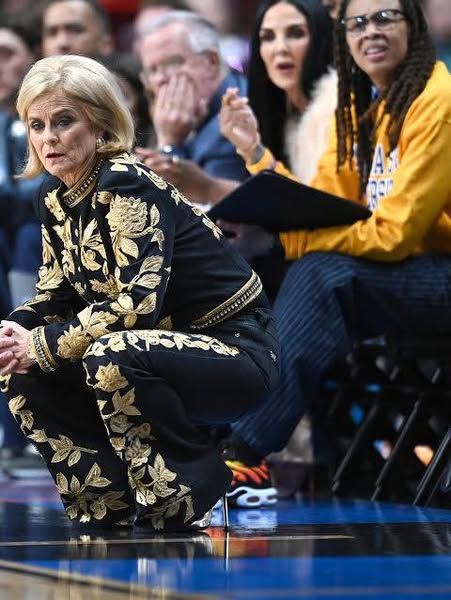College Sports Gone Wrong: Kim Mulkey’s Legacy and the Truth About Coach Pay
College sports in America have always been a controversial realm, filled with extreme passion, fierce competition, and significant financial stakes. In this intricate world of college athletics, coaches play a pivotal role in shaping the futures of their athletes, the financial trajectory of their programs, and their own legacies. Among the most intriguing figures in recent years is Kim Mulkey, the head coach of LSU’s women’s basketball team, who has earned both admiration and criticism throughout her career. Her coaching legacy is both a testament to her skills and a reflection of the broader issues surrounding college sports, particularly the growing debate about coach pay. This article delves into Kim Mulkey’s legacy, the controversies surrounding her career, and the truth about coach compensation in college sports.
Kim Mulkey: A History of Success
Kim Mulkey is undoubtedly one of the most successful coaches in women’s college basketball. She has made an indelible mark on the sport, first as a player and later as a coach. Her career began with a storied playing career, most notably at Louisiana Tech, where she won an NCAA title and earned a gold medal as a member of the 1984 U.S. Olympic basketball team. After transitioning into coaching, Mulkey’s influence only grew.
Her tenure at Baylor University, where she served as head coach from 2000 to 2021, cemented her place among the greatest coaches in college basketball history. Mulkey led Baylor to three NCAA championships (2005, 2012, and 2019), establishing the program as one of the elite forces in women’s basketball. Under her leadership, Baylor developed into a perennial powerhouse, and Mulkey became known for her fiery coaching style and ability to develop top-tier talent. Her legacy at Baylor is secure, with Mulkey helping to raise the profile of women’s sports and ensuring that the Baylor Bears remained a dominant force in women’s college basketball.
In 2021, Mulkey made a highly publicized move to Louisiana State University (LSU), a program that had not experienced the same level of success in women’s basketball as Baylor. Her decision to leave Baylor was met with mixed reactions. Some lauded her for seeking a new challenge, while others questioned her loyalty and the timing of her departure. Regardless of the opinions surrounding her move, Mulkey quickly began to turn LSU into a competitive program, culminating in the 2023 NCAA title.
Controversies in Mulkey’s Career
While Mulkey’s coaching record is undeniable, her career has been far from free of controversy. Much of the criticism stems from her persona and approach to leadership, which some consider abrasive or overbearing. Known for her intense demeanor and blunt communication, Mulkey’s style has rubbed many the wrong way. While some see her approach as an essential ingredient to her success, others argue that it can be off-putting or even harmful.
In addition to her coaching style, Mulkey has also attracted criticism for her political views and public comments. She has been outspoken on various social issues, including her stance on the national anthem protests and her refusal to wear a mask during the COVID-19 pandemic. Her views on these topics have led to polarized opinions about her in the media and among fans, particularly in a time when athletes and coaches are under increasing scrutiny for their political beliefs.
Furthermore, Mulkey’s handling of certain player situations has raised eyebrows. For example, her decision to part ways with some players at Baylor was controversial, as the circumstances surrounding their departures were not always made clear to the public. These decisions have led some to question her leadership and the way she manages relationships with her athletes, despite her success on the court.
The Pay Debate: Is Coach Compensation Fair?
One of the most contentious issues in college sports today is the compensation of coaches, particularly in high-profile programs. In recent years, coaching salaries have skyrocketed, and this trend shows no signs of slowing down. For example, Mulkey’s contract with LSU, which was reported to be worth $23 million over eight years, is one of the most lucrative deals in women’s college sports history. The size of this contract raises an important question: Are coaches in college sports paid too much, especially when compared to the financial realities faced by student-athletes?
The vast sums of money paid to coaches in major college programs have become a focal point for critics of the current system. Many argue that the compensation disparity between coaches and athletes is problematic, particularly in light of the NCAA’s history of restricting athletes’ ability to profit from their name, image, and likeness (NIL). Coaches like Mulkey, who are paid millions of dollars annually, often receive more compensation than many professional coaches in other sports. In the case of Mulkey, her deal with LSU was more than three times the amount paid to the head coach of the men’s basketball team at the same school.
This disparity in pay highlights the growing commercialization of college athletics, where the revenue generated by major programs far outstrips the resources available to athletes. The high salaries of coaches reflect the immense financial success of college sports, particularly in football and basketball, but they also highlight the growing disconnect between the business side of college sports and the educational mission of colleges and universities.
Critics argue that the amount of money directed toward coaching salaries would be better spent on supporting student-athletes, improving facilities, or reducing the financial burdens faced by the schools themselves. This sentiment is especially strong in light of the fact that many college athletes are still struggling to cover basic expenses, despite the massive revenues generated by their programs. The growing concern over coach pay is also fueled by the fact that these salaries continue to climb even as schools face mounting financial challenges, including rising tuition costs, budget cuts, and the ongoing impact of the COVID-19 pandemic.
The Commercialization of College Sports
The issue of coach compensation cannot be understood in isolation from the larger context of the commercialization of college sports. In recent decades, college sports, particularly football and basketball, have become multi-billion-dollar industries. Television deals, sponsorship agreements, and lucrative bowl games and tournament rights have turned college sports into a massive business.
The NCAA, the governing body for college athletics, has become a powerful entity that profits from the labor of student-athletes, many of whom are not compensated beyond scholarships and, in some cases, stipends. In this environment, coaching salaries have exploded. High-profile coaches in major programs are often paid more than their counterparts in professional leagues, despite the fact that their players, who generate the revenue, are not allowed to receive a salary.
This issue has sparked debates about the ethics of college athletics. Some argue that coaches should be paid exorbitant salaries because they are the ones responsible for the success of the program, attracting recruits, and negotiating TV contracts. However, this argument does not sit well with many who see it as exploitative. As college athletes gain the ability to profit from their NIL (a change initiated in 2021), the debate about compensation has shifted. While athletes now have the freedom to sign endorsement deals, the underlying issue remains: Should coaches be paid millions of dollars when student-athletes continue to face significant financial challenges?
The Gender Pay Gap in College Sports
Another dimension of the pay debate is the gender disparity in coach compensation. While male coaches of high-profile men’s programs typically command multi-million-dollar contracts, female coaches, particularly in women’s sports like basketball, often earn significantly less. Despite her success, Kim Mulkey’s salary is still lower than that of many male coaches in comparable positions.
The gender pay gap in college sports is a reflection of broader societal inequalities. Female coaches, even those who have proven themselves at the highest levels, continue to face significant obstacles in securing fair compensation. Mulkey’s move to LSU and her lucrative contract was a significant step in addressing this inequality, but it is only one example in a system where female coaches are still underpaid compared to their male counterparts.
The struggle for equitable pay in college sports extends beyond coaches to athletes themselves. Women’s college sports have historically been underfunded, and female athletes often receive fewer resources and opportunities than male athletes. The gender pay gap in coaching salaries is one of the many ways in which college sports continue to reflect and perpetuate broader societal issues.
A Complex Legacy
Kim Mulkey’s career in college basketball is a testament to her talent, leadership, and ability to build successful programs. However, her legacy is also intertwined with some of the more troubling aspects of college sports, including the growing commercialization of athletics, the disparity in pay between coaches and athletes, and the ongoing gender inequalities in coaching salaries.
While Mulkey’s success on the court is indisputable, it is crucial to view her legacy through a critical lens, recognizing that her story is part of a larger conversation about the ethics of college sports. The enormous salaries paid to coaches like Mulkey raise important questions about the priorities of college athletics and the role of financial considerations in shaping the landscape of college sports. As long as college sports continue to be driven by financial motives, the debate over coach pay and the compensation of athletes will remain a central issue.
Ultimately, Kim Mulkey’s legacy will be defined not only by her coaching accomplishments but also by how she navigates the complex and often controversial world of college sports. As the NCAA and its stakeholders grapple with these issues, it will be crucial to ensure that the future of college athletics is fairer and more equitable for all involved, from the coaches to the athletes. The truth about coach pay may be a complicated one, but it is a conversation that must continue if we are to create a more just and sustainable model for college sports.
This article discusses Kim Mulkey’s coaching legacy, the controversies surrounding her career, and the broader issues in college sports, particularly coach pay. Let me know if you’d like me to elaborate on any specific section or adjust the focus!



